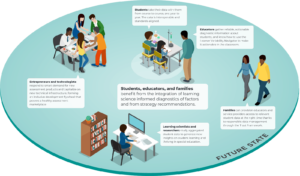The Achievement Recession
Given middle of the pack reading levels on PISA results, the National Journal asked the ridiculous question, “what’s so awful about being average?” They seem to ignore that US math and science results are much worse and lag most of the developed world. As dumb as the prompt was, it got a few of us to write a response. Here’s mine.
Twenty years of prompting, investing, threatening and reforming have largely failed to dramatically improve education in American. There are pockets of excellence, but results from American schools are flatlined. While unions and school boards argue about contract minutes, the rest of the developed world passed us by in achievement, high school graduation and college completion rates.
Why does this matter? McKinsey suggests that lagging U.S. achievement amounts to a permanent recession the size of what we’re digging out of.
In a recent edReformer blog my colleague Marshall Roslyn, who just returned from two years running the Learn Capital office in Beijing, agrees with Checker Finn. “If China can produce top PISA scorers in one city in 2009—Shanghai’s population of 20 million is larger than that of many whole countries—it can do this in 10 cities in 2019 and 50 in 2029. Or maybe faster.” Marshall added the emphasis “because one of the key lessons I have learned from the several years I have spent living and working in China is that milestones there always seem to hit faster than anyone expects.”
There is an idea economy and a service economy. Between the two growth sectors, middle class jobs—the ones that created two-car-garage suburban American—are disappearing. Learning is the entry ticket to the idea economy.
The PISA results suggest that most other OECD countries are going a better job preparing a higher percentage of young people for the idea economy. The result is that our children will be the first generation of American kids to be less well off than their parents. The slide will continue unless we confront the data and the barriers to improved achievement.
See great OpEd in USAToday 12/15/10






0 Comments
Leave a Comment
Your email address will not be published. All fields are required.